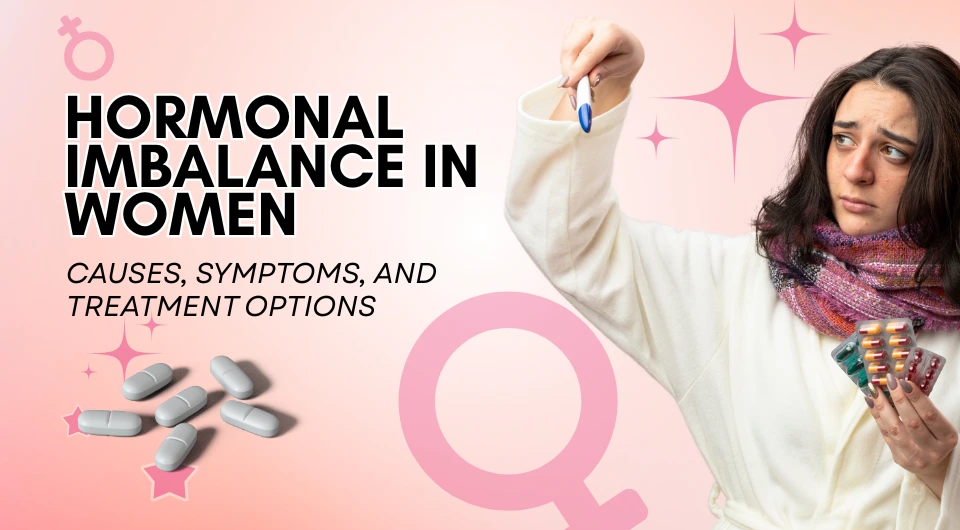For too long, the narrative around men’s health and vitality has been dominated by a single hormone, which is testosterone.
| Feeling tired? = “decreased T count, it is!” Low libido? = “Must be low T!” Gaining weight? = “Go Check your T levels!” |
While undeniably a critical player, this singular focus often blinds us to a far more intricate and widespread issue: hormonal imbalance in men that extends well beyond just testosterone.
Let’s burst some of the common assumptions about male hormonal health that many people have:
- Myth: Estrogen is solely a female hormone, irrelevant to men’s health.
Fact: While often portrayed as a female hormone, men produce estrogen, and it’s crucial for everything from bone health to libido. - Myth: Symptoms like fatigue, low libido, or mood changes are always a direct sign of low testosterone.
Fact: The “stress hormone” cortisol can directly suppress testosterone, leading to symptoms often mistaken for low T. - Myth: Men’s hormones remain constant, unlike the cyclical nature of women’s hormones.
Fact: Just like women, men experience hormone cycles, too! Men’s hormones fluctuate on a monthly and even daily basis, affecting biological processes, moods, and emotions in many of the same ways they do in women. This means men can become stressed, grumpy, and irritable, with moods sometimes changing from one extreme to another.
The male endocrine system is a complex, interconnected system, and when even one component is out of sync, the entire performance suffers.
Beyond the T-Factor: The True Scope of Male Hormonal Imbalance
When men experience symptoms like fatigue, low libido, or changes in mood, the immediate assumption often jumps to “low testosterone.” And rightly so, as it is a prevalent concern. Data from the American Urological Association indicates that approximately 20% of men over 60, 30% over 70, and 50% over 80 have low testosterone. It’s also estimated that low testosterone affects 1 in every 4 men over the age of 30 in the United States, impacting 13 million men.
However, focusing only on hormone imbalance from this perspective is a serious mistake. Accurate diagnosis and successful therapy depend on the understanding that male hormonal imbalance involves a broader range of hormonal players.
Other Hormones at Play and Their Impact
We must look beyond testosterone if we want to fully comprehend male hormonal imbalance. Male health is significantly influenced by a number of other hormones:
1. Cortisol: The Stress Hormone’s Double-Edged Sword
Produced by the adrenal glands, cortisol is essential for regulating metabolism, immune response, and the body’s stress response. While good for short-term stress, ongoing high cortisol from chronic stress can cause major problems. High cortisol can suppress testosterone production.
Studies have shown a negative correlation between chronically elevated cortisol levels and lower total testosterone in men. This can lead to many of the same signs of low testosterone while also causing:
- Symptoms are sometimes described as adrenal fatigue, i.e., persistent exhaustion, even after rest.
- Weight gain, particularly around the midsection.
- Anxiety and increased irritability.
- Sleep disturbances, like difficulty falling asleep or waking up frequently.
- Weakened immune function.
2. Estrogen: Not Just a Female Hormone
Men produce estrogen, although in smaller quantities than women. It’s vital for bone health, libido, and even sperm production. Normal adult male estradiol levels typically range from 10-40 picograms per milliliter (pg/ml). However, an imbalance can occur, leading to issues. High estrogen levels in men can result in:
- Gynecomastia (enlarged breast tissue): This is one of the strongest indicators of hormonal imbalance in men.
- Erectile dysfunction
- Decreased libido
- Fatigue
- Increased body fat, sometimes with a more “female” fat distribution.
- Mood swings and depression.
Conversely, low estrogen in men can also lead to problems like bone loss and increased visceral abdominal fat, which raises the risk of cardiovascular disease and diabetes.
3. Thyroid Hormones: The Body’s Master Regulators.
The thyroid gland produces hormones that control metabolism, energy levels, body temperature, and more. Both an overactive (hyperthyroidism) or underactive (hypothyroidism) thyroid can cause a wide array of nonspecific symptoms that can easily be mistaken for low testosterone or general aging.
While thyroid disease is more commonly diagnosed in women, it is by no means rare in men. Hypothyroidism affects between 3% and 16% of men in the U.S., with the risk increasing with age.
Symptoms of an underactive thyroid in men (hypothyroidism) can include:
- Fatigue and sluggishness
- Weight gain
- Cold intolerance
- Constipation
- Dry skin and hair loss.
- Depression.
- Sexual dysfunction: Studies report that men with hypothyroidism often experience low libido, erectile dysfunction, or delayed ejaculation.
4. Prolactin: The Often Overlooked Hormone.
While primarily known for its role in lactation in women, prolactin is also present in men. Elevated prolactin levels (hyperprolactinemia) can suppress testosterone and lead to:
- Decreased libido
- Erectile dysfunction
- Gynecomastia
- Reduced body hair.
This condition affects less than 1% of the general population and can be caused by certain medications, kidney disease, or a benign pituitary tumor (prolactinoma).
5. DHEA: The “Mother” Hormone
Dehydroepiandrosterone (DHEA) is a precursor hormone produced by the adrenal glands, which can be converted into other hormones, including testosterone and estrogen. DHEA levels naturally decline with age. Low DHEA can contribute to the following:
- Reduced vitality and energy
- Decreased muscle mass
- Lowered immune function
- Mood disturbances.
6. Sex Hormone Binding Globulin (SHBG): The Carrier Protein
SHBG is a protein that binds to sex hormones like testosterone and estrogen, transporting them into the bloodstream. While SHBG itself isn’t a hormone, its levels directly impact how much “free” (bioavailable) testosterone your body can actually use. High SHBG can effectively reduce the amount of usable testosterone, even if total testosterone levels appear normal. This can lead to symptoms of low testosterone, despite what a standard total testosterone test might suggest.
Recognizing Signs of Hormonal Imbalance in Men
The takeaway is clear: if you’re experiencing persistent and bothersome symptoms, don’t just focus on “low T.” Consider the broader spectrum of hormonal imbalance symptoms. A comprehensive evaluation by a healthcare professional is crucial. This typically involves:
- A detailed discussion of your medical history and symptoms.
- A physical examination.
- Blood tests to measure various hormone levels (testosterone, free testosterone, estrogen, cortisol, thyroid hormones, prolactin, DHEA, SHBG, etc.).
- Potentially, imaging studies if a tumor or other structural issue is suspected.
Treating hormonal imbalances often involves a multi-faceted approach. Depending on the specific imbalance, it could include lifestyle modifications (diet, exercise, stress management, sleep), targeted hormone replacement therapy, or medication to address underlying conditions.
Ignoring these male hormonal imbalance symptoms can have a significant impact on your quality of life, energy, mood, and overall health. Taking a proactive approach and seeking expert guidance is the first step towards restoring balance and reclaiming your vitality.
FAQs:
Q1: How are hormonal imbalances diagnosed in men?
Ans- Diagnosis typically involves a thorough review of your medical history and symptoms, a physical examination, and specific blood tests to measure levels of hormones like testosterone (total and free), estrogen, cortisol, thyroid hormones, prolactin, DHEA, and SHBG. Sometimes, imaging tests might be needed to identify underlying causes like tumors.
Q2: Can stress cause hormonal imbalance in men?
Ans- Absolutely. Prolonged stress raises cortisol levels, which can directly inhibit testosterone production and throw off the balance of other hormones. This can lead to a number of symptoms that are frequently linked to hormonal imbalance.
Q3: What are the treatment options for hormonal imbalance in men?
Ans- Treatment varies depending on the specific hormone imbalance. Options can include lifestyle modifications, hormone replacement therapy, medications to address specific underlying conditions, and nutritional supplementation.
Q4: Can diet affect male hormones?
Ans- Yes, diet plays a significant role. Hormone synthesis and regulation may suffer from a diet high in processed foods, bad fats, and sugar. On the other hand, proper hormonal health can be supported by a balanced diet that includes whole foods, lean proteins, healthy fats, fruits and vegetables.
Q5: Are there natural ways to improve hormonal balance in men?
Ans- Yes! Many men may maintain their hormonal balance through lifestyle adjustments like regular exercise, good stress management, getting enough sleep and eating a diet high in nutrients but severe imbalances may necessitate medical intervention.
Disclaimer: This blog/content is for informational purposes only and should not be considered medical advice. Always consult a healthcare professional before starting any treatment. The content is not intended to diagnose, treat, cure, or prevent any condition. Purchase medications only from reputable sources to ensure safety and authenticity.







